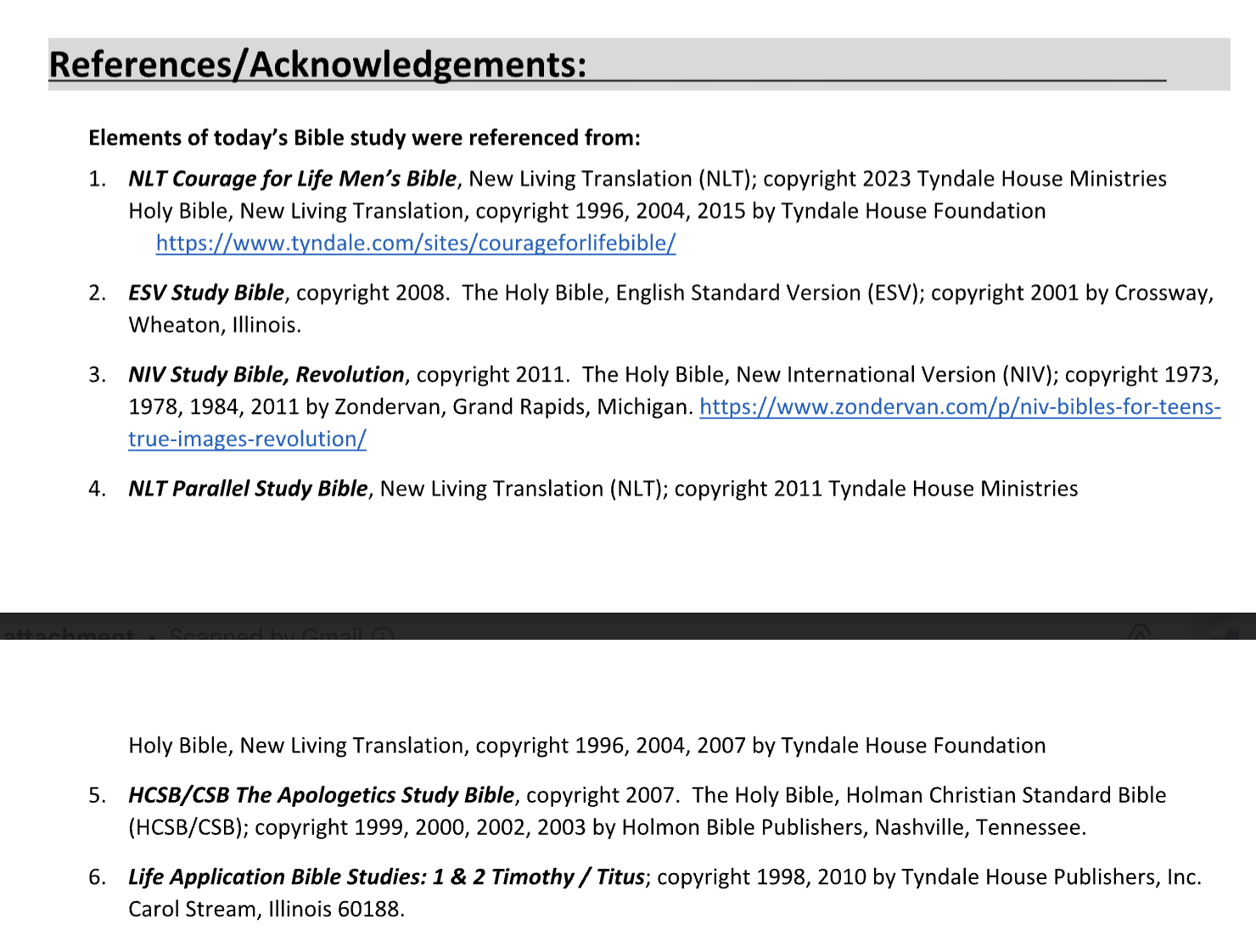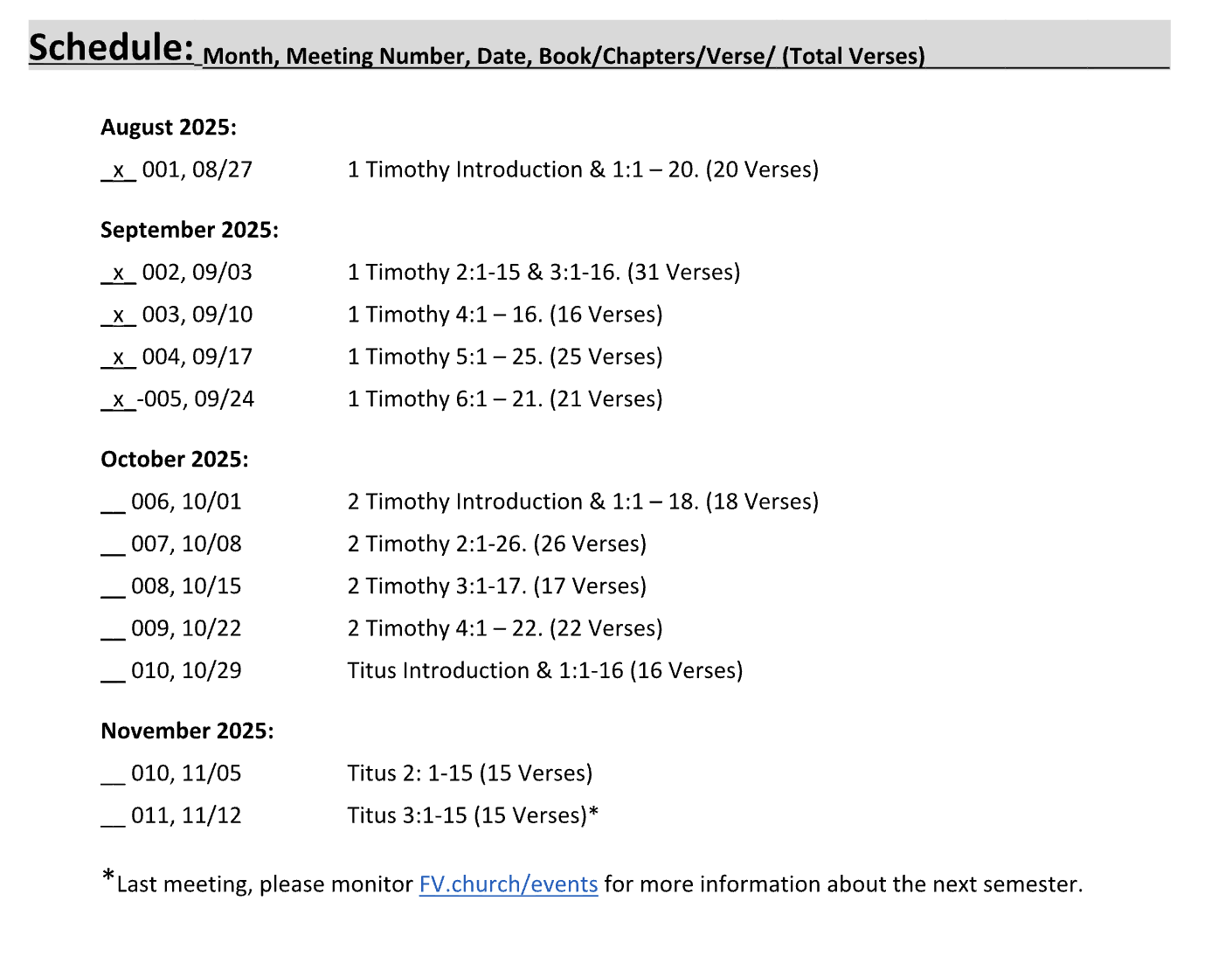Weekly Wednesdays: CALLED Men’s Group | Wednesday, September 24, 2025
Meeting# 5 of 12 | This Week’s Leader: David Goodno
INTRODUCTION: Welcome everyone, this is the fifth meeting of the Called Men’s Growth Group Fall 2025 semester. Reminder: we meet weekly, every Wednesday through November 12, 2025; 7:00 pm – 8:30 pm.
Tonight, we are continuing with the SOAP study* of First Timothy. (*SOAP study: Scripture, Observation, Application, Prayer and Questions). – Later on in the semester we will also study Second Timothy and Titus.
There is no specific prerequisites or formal “membership” required to attend; it doesn’t matter where you are in your faith journey – 10 seconds, 10-years or a lifetime; everyone is welcome; everyone has value; everyone has a voice. Please keep in mind that we are all in different places of our faith journey; we all come from various backgrounds, have different points of view. The purpose of tonight is to come together, read and study God’s word, develop an understanding, grow in our faith and have a friendly discussion.
If there are differing points of view, we should not feel attacked or be hostile to one another; it is our different points of view that add to the discussion. We came together tonight as friends and brothers in Christ. And we should leave the same (as friends and brothers in Christ). Often there is no right or wrong answer; just interpretation of scripture from various Biblical scholars, and Biblical scholars don’t always agree; ultimately, JESUS IS THE ANSWER.
REMINDER: Rich Kaiser and Samuel Jaquez are putting together a Men’s retreat, to take place at a remote hunter’s cabin near Emporium, Pennsylvania. The purpose is to return to nature and study God’s word. The planned dates for the retreat are Thursday, October 2 nd through Sunday, October 5 th . (Note that Rich and Sam are debating if they will have the last day of the retreat on Saturday or Sunday. As of now, they are planning the retreat to go through Sunday.)
Those who are interested in attending please speak to Samuel Jaquez or Rich Kaiser. Costs are $60 to attend three days; $45 to attend two days. Attendees will need to bring a Bible, notebook, pen/pencil, sleeping bag (or bedding/blankets), pillows, clothes, shoes and slippers, snacks, bottled water etc. Talk with Sam or Rich to get a full packing list. Please note there is no running water at the cabin, and the bathroom is an outhouse, so attendees should bring dude-wipes/baby wipes and plan on bringing their own water (Discuss with Sam and Rich).
BACKGROUND: History of the letters: (1 & 2 Timothy )
Paul is author of these letters to Timothy, with Biblical scholars dating the two letters around 64 AD.
Paul wrote the letters to give encouragement and instruction to Timothy, who was a young leader sent by Paul to the Church of Ephesus. As a young minister Timothy faced all sorts of pressure, conflicts, false teaching and challenges from the surrounding culture. Paul instructed Timothy to preserve the Christian faith, remain disciplined; oppose false teaching, and to minister faithfully; by example.
Today we can use the letters to Timothy to strengthen our own faith and spiritual discipline.
PRAYER: This Week’s Prayer: Father God, we thank you for allowing us to come together tonight and study your word. Father, give us the strength and ability to obey You; with our thoughts, with our words, with what we do, and the decisions we make. Help us grow stronger in our faith and in ability to recognize worldly lies and false teaching. In Jesus name – Amen
Scripture, Read: 1 Timothy Chapter 6
Observation, Application & Questions: (Identify/Discuss Among the Group)
Key verses for discussion:
Google search: what is the difference between Slaves in Jesus’ time vs. early colonial slavery?
Key differences between slavery in Jesus’ time and early colonial slavery include:
Historical Context: In Jesus’ time, slavery was a part of the Roman Empire, where it was common and often accepted, while early colonial slavery was often based on forced labor and was more oppressive and exploitative.
Motive for Slavery: In ancient NTS, the primary motive was often economic relief for the servant, whereas in NWS, slaves were taken for economic gain by their masters.
Entry into Slavery: In ancient NTS, the path to slavery was often voluntary, while in NWS, people were taken into captivity against their will.
Treatment of Slaves: In the New Testament, slaves were treated with respect, and there were guidelines for their treatment, which were not always upheld by Christians.
Abolition of Slavery: The New Testament reflects a gradual shift towards treating slaves with dignity, and there were movements advocating for their freedom, which were not present in the early colonial context.
These differences highlight the evolving attitudes towards slavery over time and the impact of religious teachngs on societal views. See the following links for more information:
https://www.bibleodyssey.org/articles/slavery-in-the-new-testament/
Google Search: What is a Doulos and how is it different than a slave?
A “doulos” is different from a slave in that the term “doulos” carries a sense of voluntary submission and loyalty, often associated with a deeper relationship of trust and dedication. In contrast, a slave is typically held in a permanent position of servitude, with no rights or ownership.
https://www.ministryvoice.com/doulos-in-greek/
The term “doulos” reflects a transformative relationship with God, where believers are called to live in humble service, reflecting Christ's love and mission.
The term “doulos” is a Greek word that holds significant meaning in the context of the Bible. It is commonly translated to mean “slave” or “servant.” However, its implications go deeper than just the translation of ‘slave’.
Understanding “doulos” can give us insight into relationships within the early Christian community and how they viewed service and loyalty. In the ancient Greek language, “doulos” (δοῦλος) is derived from the root word “deō,” which means “to bind” or “to tie.” This is important because it reflects the idea of someone who is tied or bound to another person, essentially a person who is under the authority and care of someone else.
The relationship is not just one of labor; it often included a deep sense of loyalty and commitment.
In the Bible, “doulos” is used to describe various figures, including Paul, who often refers to himself as a “doulos of Christ.” This indicates that he sees himself not just as a follower but as someone who has willingly bound himself to the service of Jesus. This reflects a relationship built on trust and dedication rather than coercion or force.
The NLT translates “doulos” as “Slave” however other Bible translations, use the word “Bondservant” whenever the Greek text contains the “doulos” (δοῦλος).
The NLT translation uses the word “rich” to describe greed. What do we think the difference is between being rich, being wealthy and greed?
Being rich primarily describes a high income and lavish spending on material possessions and experiences, often focused on immediate gratification. Being wealthy is about building and preserving assets and using finances to generate future income or security. Wealth provides financial freedom and control over one's time, while richness is more about the immediate display of financial status.
In the Bible, wealth itself isn't the sin; it's the desire for more—that is what we call “greed.” While being rich involves possessions and resources, greed is characterized by a relentless, selfish pursuit of money, power, or possessions that leads to an inability to be content, with the disregard of others. The key difference lies in the attitude and desire: The greedy are those consumed by the lust for money and power; failing to give God glory, practice generosity, or using our resources to serve others.
Why do we think the Bible talks about wealth, riches and greed (love of money) so much?
Reminder: Share the story of Chloe, Tobias and Missy.
(Chapter 6, verses 1-11) -
In Paul’s culture there was a great social and legal divide separating masters and slaves; as Christians this social/legal divide was wiped away. As Christians both slave and master are equals – which sets Christianity apart from other religions.
Paul did not speak against the institution of slavery; however, it is important to remember that slavery in Paul’s time was not the same as slavery as we know it in our time. Also, Paul gave instructions and guidelines for Christian slaves and Christian Masters.
Read: Galatians 3:23-29
Ephesians 6:5-18
Paul warned Timothy of becoming too caught up in chasing wealth, we should also take heed to these instructions. Most people think that money can buy happiness. While money provides for our financial needs, wants and desires, we should not let money overtake growing in our faith and working on our spiritual needs.
We need to be content with what we have and not always be chasing money. Because what’s better than money? – more money, right? But we have to ask ourselves, when is enough, enough?
Read: Luke 16:10-15
Matthew 6:19-34
1 John 2:15-17
Hebrews 13:1-8
2 Peter 3:8-10
(Chapter 6, verses 12-21)
Paul uses the words: run, pursue, fight, hold tightly – to describe the Christian life. We must have an active faith. Training, working hard, sacrificing and doing what we know is right; we must actively grow in our faith.
Ephesus was a wealthy city, and Biblical scholars believe that the Ephesian church had many wealthy members, Paul instructed Timothy to teach that having riches and wealth comes with great responsibility. If someone has been blessed with wealth, then we should encourage them to thank the Lord, recognize the Lord as their provider and source and to not ever stop chasing and seeking Jesus.
It is important to remember that the church is not for a social gathering on Sundays; living a Christian life means more than just attending church on Sunday and then going back to our lives during the week. We are to be active supporting one another, encouraging others to grown in their faith, to spread the gospel. We are to know Jesus, and develop a relationship with Him, so we recognize Him, and more importantly so that He recognizes us.
Read: Matthew 10:26-33
Other questions to explore:
What was the context? What was going on at the time this was written?
What and where is this happening?
What makes what was happening meaningful?
Is there anything special about the location (or locations)?
Who is involved?
How do they respond to God?
What character traits do you notice about them?
What is the significance of their involvement?
What do you think is the key message?
Did anything that surprised or stood out to you? What was it? Share with the group and discuss.
Are there any key verses that stand out to you? Discuss among the group.
Were there any repetitive words or themes that stood out to you? What were they?
---
Is there anything that left you with more questions? What were they? Share with group, discuss, and research.
Biggest takeaway?
Prepare for next week’s meeting. Read: 2 Timothy 1:1-18
Is there anything that stands out when reading these verses? Be ready to discuss it at the next meeting.
https://www.biblegateway.com/passage/?search=1%20Timothy%201&version=NLT
Think of things that you can do to encourage new believers over the next seven days.




